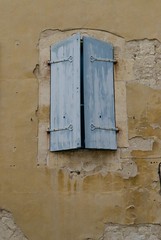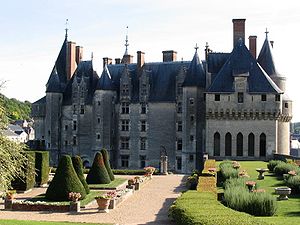 Image by geishaboy500 via Flickr
Image by geishaboy500 via Flickr
The broad beans are ready in the garden. I have had the pleasure of their heavy scent earlier in the year and now they will be bringing me bittersweet memories as I make them into a puree with potatoes.
I had a great friend who died some five years ago who incarnated for me what was best in French life. She had grown up in a small village, had liberated herself by education and gone to run a bookshop in Paris. In the great days of 1968 she had fallen in love with an electrician who, with his colleagues, had welded himself into the car factory at Boulogne-Billancourt as part of the workers' protest and they had married. They ran a bar at Nantes for years and then retired to her native village where they lived a quiet life behind their shutters, reading, gardening and listening to music.
She was a firm republican and anti clerical, though the local priest was often to be found taking an aperitif at her hospitable table, and introduced me to that stream of life which now seems to be totally submerged....that battle for supremacy between church and state over the minds of French citizens. For her, the struggle for non religious education was still alive and she thought that the heritage of the 'black hussars' - the schoolteachers who inculcated republican values in the children in their charge once the state had introduced universal free education - had been squandered by the existance of 'private' schools in almost every commune. These schools run alongside the state schools and offer a Catholic education, but most parents use the dual system to play one school off against another to get what they want in terms of how little Johnny is treated at school. She thought it was scandalous that local councils gave grants to these institutions, and was distinctly vocal on the subject every year when the budget was discussed.
She had even been a 'godmother' at a Republican baptism...something lost in the mists of time, but revived by her and her friends on the occasion of a birth in the family. Growing up as she did in a period when if a man was not seen at mass with his family on Sunday, he would not be employed by the pious exploiters of the area, the Church disgusted her as an institution and she would not set foot in one of its buildings, even to admire the architecture......not that she was missing much in that respect in our area!
She let me loose on her book cupboard, gave me reading lists, discussed books, authors and...of course...politics! Politics national, politics local, politics international, nothing escaped her interest and sharp analysis and I would regularly turn up at her kitchen door to be greeted by an arm waving a newspaper and the cry of
'Pardi, you'll never guess what has been happening!' in her deep, enthusiastic voice.
She was, to all outside appearances, the classic rural frenchwoman. On market day she went to town with her husband and left him playing cards in a cafe while she did the shopping, the terror of stall holders as she enquired into the freshness, age and quality of everything that caught her eye. I was taken once to her favourite cheese stall, where the owner had rashly offered her some Cheddar the week before. Fixing him with an Ancient Mariner eye she told him that she had brought someone British with her in order to test this unknown quantity and I had to describe what a mature and semi mature Cheddar should be like before I was allowed to taste his offering and give judgement. In one of the Lord Emsworth short stories, P.G. Wodehouse describes the butler laying something on the table before his employer as if it had been a smoked offering and his lordship a tribal god. Lord Emsworth eyes his butler sourly with the manner of a tribal god who considers the smoked offering not up to sample, and that passage describes my friend to a T when faced with spending her money on something she could not produce herself from her garden or kitchen.
Generosity itself, she could not bear to be cheated. With a family celebration in mind, she had gone to a distant cousin in the next village to buy wine. She had tasted and chosen, and the wine was duly delivered. On the morning of the great day she decide to taste the wine again, as being the only thing on the menu not under her control, and found that the cousin had fobbed her off with an inferior wine to that which she had chosen. The wine was packed in the back of the car and she took it back, interrupting her cousin when he was busy with a group of prospective buyers. Well, suffice it to say that the prospects melted away in the heat of her displeasure and she came back with the wine which she had ordered plus a case of dessert wine in lieu of the petrol.
'So everything was O.K. in the end?'
'No, the wine was shaken up and hadn't had time to settle.'
I was then made privy to startling revelations about the private life and family history of the cousin which made even my straight hair curl. And I'd thought he was so respectable!
She cooked with the same attention to detail which characterised her entire life, and demanded the respect due to her work. Her husband knew that lunch was served at one o'clock and that if he were to be late, his meal would be given to the dog. He loved playing cards and while going home for one o'clock was no hardship if he was losing...his wife's reputation providing any excuse necessary...if he were to be winning, the tussle was hard. However, he knew his duty and by two minutes to one, there would be a sound of feet pounding the pavement outside and the clang of the bell as he flung himself through the front door which he had had the foresight to leave unlocked before departing for the bar.
One of her specialities was a broad bean puree which she had taken from a recipe by Paul Bocuse. I don't know what his was like, but hers was sublime! She was particular about the variety of broad bean and the variety of potato and kept a close eye on her pans to ensure that the texture was right..melting without being sloppy. It sounds trivial, but, to me, that puree summed up a lot about her. It was worth taking time and thought to obtain a worthwhile result, in cooking, in politics, in life.
I'll be thinking of her as I cook the broad beans.
![Reblog this post [with Zemanta]](http://img.zemanta.com/reblog_e.png?x-id=3a1f6187-42d8-4279-9e18-80a8f91bf23a)

![Reblog this post [with Zemanta]](http://img.zemanta.com/reblog_e.png?x-id=0ec1ac8a-b460-4480-a4e1-9a3c0901dbbf)
![[Portrait of Robert Burns, Ayr, Scotland] (LOC)](http://farm4.static.flickr.com/3610/3449543485_ccac6627ca_m.jpg)
![Reblog this post [with Zemanta]](http://img.zemanta.com/reblog_e.png?x-id=d5506b56-dd62-4c5f-ab8e-0f38afb13d3e)

![Reblog this post [with Zemanta]](http://img.zemanta.com/reblog_e.png?x-id=e60a24b3-9403-455d-b688-18333076f26f)

![Reblog this post [with Zemanta]](http://img.zemanta.com/reblog_e.png?x-id=6b6facb4-c30f-49df-816d-80717b77a193)

![Reblog this post [with Zemanta]](http://img.zemanta.com/reblog_e.png?x-id=e2ae7ff2-9e35-4d25-b683-7d0edd8fca3f)
![Reblog this post [with Zemanta]](http://img.zemanta.com/reblog_e.png?x-id=fb0edd14-5269-49c1-af31-8df08f86ca9f)

![Reblog this post [with Zemanta]](http://img.zemanta.com/reblog_e.png?x-id=74f08edf-f11c-4614-b509-3336f2403b59)

![Reblog this post [with Zemanta]](http://img.zemanta.com/reblog_e.png?x-id=1b1dc163-99bc-4ba4-9461-248a42d4f46c)





